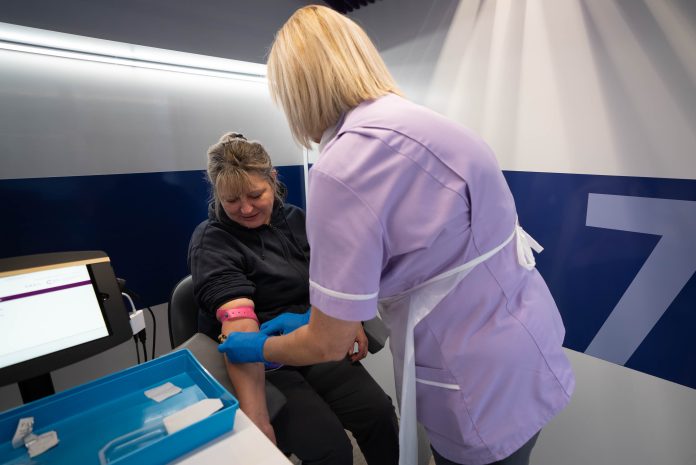As hundreds of thousands of NHS-Galleri trial blood test appointments across England come to a close, a leader from the Greater Manchester Cancer Alliance is thanking the 20,000 participants in Greater Manchester along with community organisations, for supporting the NHS-Galleri trial – the world’s largest research trial of a multi-cancer early detection blood test.
Mobile clinics have visited locations across the region, including Oldham, Salford, Hulme, Trafford, Bolton, Bury, Rochdale, Wigan, Stockport and Tameside to collect blood samples from volunteers taking part in the NHS-Galleri trial. This month [July] marks the last blood sample collection appointments for the trial, concluding three rounds of blood sample appointments for participants.
The Greater Manchester Cancer Alliance was selected along with seven other regions to support the trial. Around 140,000 volunteers enrolled from many different socio-economic and ethnic backgrounds across England.
Alison Armstrong, Associate Director at Greater Manchester Cancer Alliance, said: “Participating in clinical research has the potential to improve the way that cancer is detected, and we are hugely grateful to people in the region who volunteered for this research.
“Community groups including Can Survive-UK, the Caribbean and African Health Network, Winning Hearts and Minds as well as our local council partners and local Healthwatch teams have all helped the trial to reach and retain a very diverse group of participants who reflect the people who live in our area.”
The trial aims to see if a Multi-cancer early detection (MCED) blood test (Galleri ® ) can help detect cancer early when used alongside population screening programmes. Finding cancer early often means it is easier to treat. Volunteers were all aged 50 to 77 years old at the point of enrolling onto the trial and had not been diagnosed or treated for cancer in the last three years.
Professor Richard Neal, Chief Investigator for the trial, said: “Volunteers have played their part and we are grateful for their time and commitment. But the work of researchers continues with results due to be published in 2026. We’ll continue to collect information from the NHS so that researchers can assess whether there are significant differences between the group of participants whose blood was screened with the Galleri test and participants whose blood was not tested.”*
Early research has shown that an MCED test could help to detect cancers that are typically difficult to identify including cancers for which there is no national screening programme.
The NHS-Galleri trial is being run by the Cancer Research UK Cancer Prevention Trials Unit at King’s College London in partnership with the NHS and healthcare company, GRAIL, which has developed the Galleri test.







